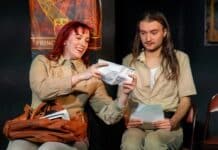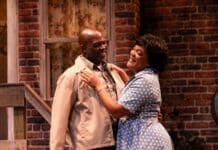Something is afoot at the Workhouse Arts Center. They seem to have discovered a magic spell for executing lesser-known comedic texts that have the potential to teeter but that Workhouse turns into certifiable top-tier comic theater. I reviewed their recent production of The Drowsy Chaperone, and I am becoming increasingly convinced that they sold their souls to the comedy gods for some magical secret to flawless theatrical laughs.
Steve Rosen and Gordon Greenberg’s Dracula: A Comedy of Terrors is a 90-minute parody of Bram Stoker’s Dracula that premiered off-Broadway last year, and its big-time roots are clear in its overall excellent script. Given its relatively short runtime, the show’s reliance on a cast of five’s exhaustive work playing multiple characters each (the show’s licensing page notes its inspiration from The 39 Steps), and its premise of being a parody show of a well-known property, could all bode a mediocre affair. But under Danilo Stapula’s direction at the Workhouse Arts Center, the show is an utter joy and one of the best I’ve seen recently.
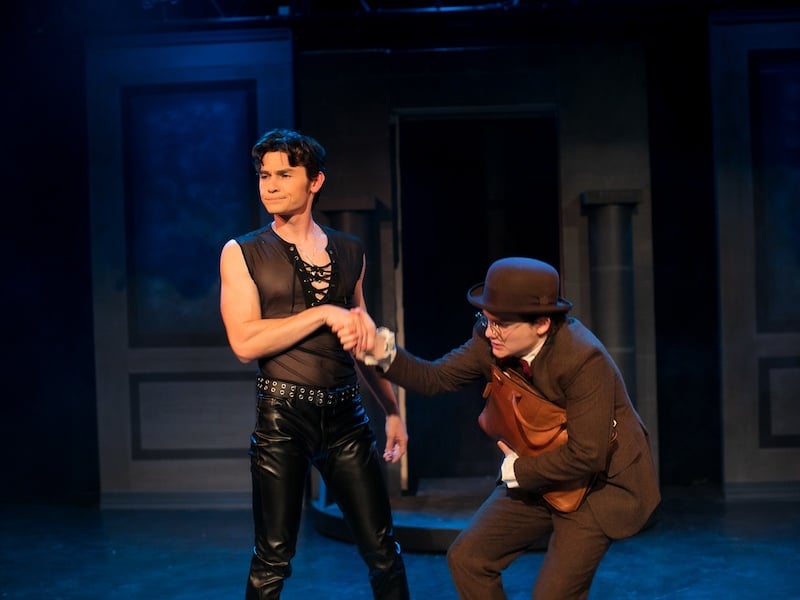
The vast majority of the script also defies comedic and literary expectations. The show walks through the plot of Dracula, joking smartly about plot points and symbols in Stoker’s novel but also adding Shrek-like pop culture references throughout. There are only a few jokes that take you out of the moment — the rest of the time, you’re marveling at how good this show is.
The show is a genuine comedic treat with surprising intelligence, amplified by an excellent cast that brings all their energy to the role. This production dashes through its script, not stopping to linger or waiting to make sure you got the joke, to the show’s great benefit. Too many comedic plays and comedy shows slow jokes down out of fear audiences won’t get it and keep the dopamine and serotonin going at merely a drip. By contrast, Dracula: A Comedy of Terrors is gushing with it.
Noah Mutterperl steals the show as a hilariously sexy Dracula, posing and suggestively gesticulating at every turn. This adaptation of Dracula has come full circle by taking inspiration from aspects of Rocky Horror, a parody of Dracula in its own right. Mutterperl’s Dracula becomes a multifaceted parody of the “sexy monster,” the “monster boyfriend” (and yes, those are two different things), the hypersexualized antihero, how silly antiheroes are as a concept, and the novel Dracula itself: the book so often is masqueraded as sophisticated, moralistic classic literature when it is sensual, not to mention steamy and campy, in its roots and breaking of taboos. We see Dracula in this show and Mutterperl’s performance as we see him signified in the novel: an overtly sexual character in a novel that seems to want or need to hide its glaring symbolism. Something is refreshing about seeing the glare of the symbolic meaning of this novel laid bare on stage. He’s always covered up, but you get it.
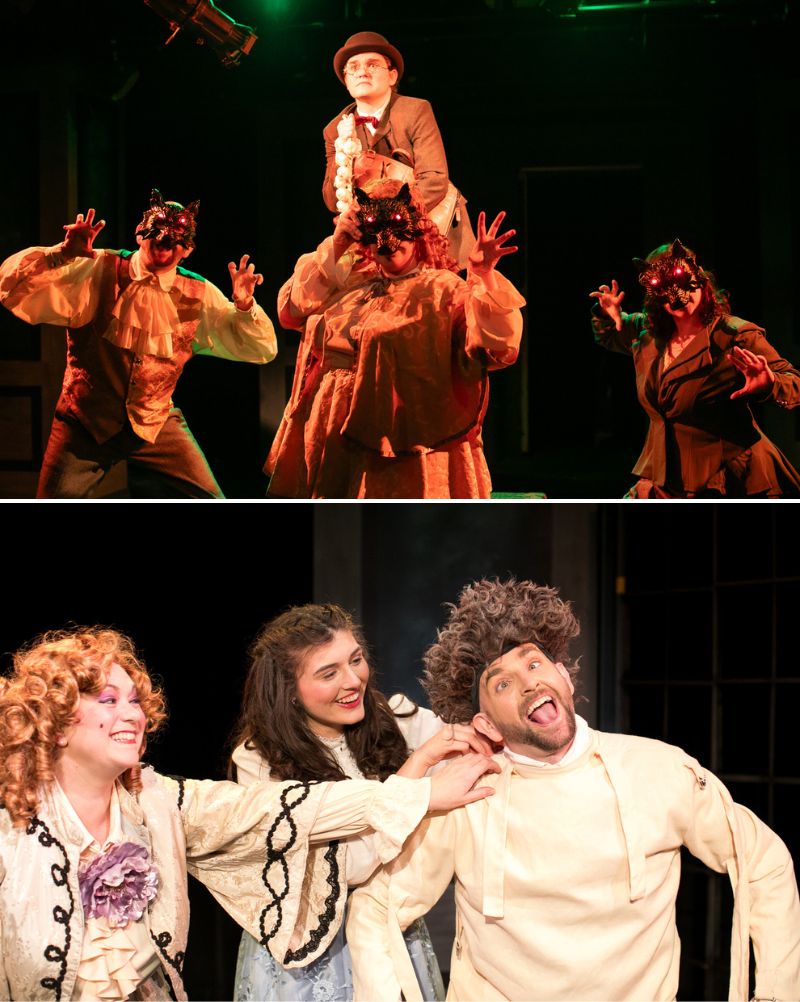
In line with this, many of the show’s jokes, especially those delivered verbally or physically by Mutterperl, point out the gothic fantasy genre’s, and the general entertainment world’s, acceptance of sexual harassment. The overtly ridiculous attempts by Mutterperl to seek and seize sexual gratification from women as he pleases highlights the sheer nonsensicality of abusing power for selfish purposes. Under Intimacy and Fight Coordinator Jillian Riti’s direction, Mutterperl’s exaggerated yet surprisingly nuanced performance in the title role is a key vehicle for the show’s ability to come across as quietly intelligent as it is.
The script has switched the roles of Lucy and Mina from their roles in Stoker’s novel, for some reason: Harker’s fiancée is Lucy, and Mina is the one with limited romantic prospects. Maybe there was a smart joke wrapped up in there somewhere: I missed it if so. That said, Hope Cassidy is a fantastic Lucy, being utterly immersed in her line delivery and believably in love with the adorable Seth Drenning as Jonathan Harker, who plays the Nervous Little British Guy stock character with such archetypical accuracy that his performance becomes wonderfully satirical. When he and Dracula have one-on-one, subtext-laden exchanges, you feel like you’re watching Good Omens.
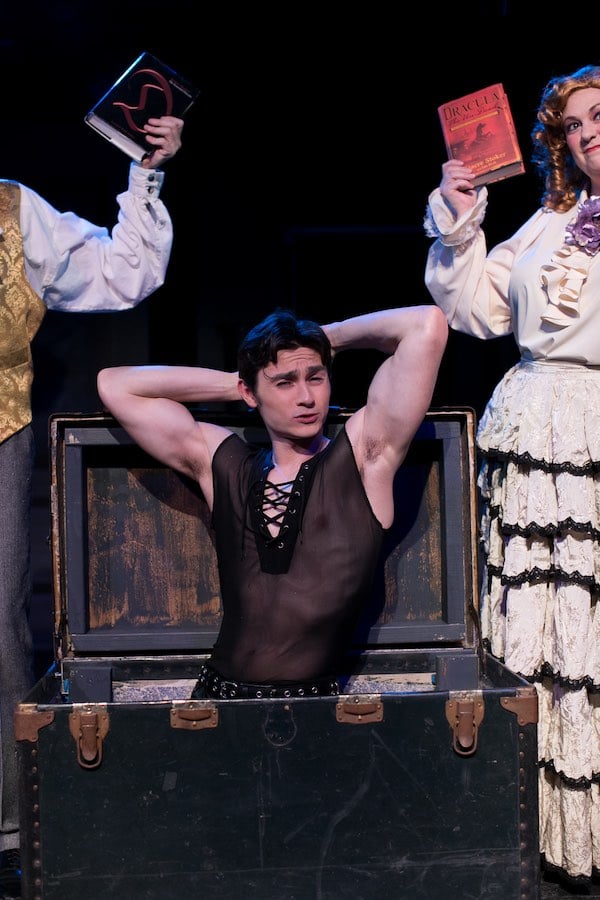
Adam R. Adkins is an incredibly talented costume-changer, improviser, and comic: as Renfield, Dracula’s insect-eating sidekick, Adkins is a comedic tour de force, playing dramatically different characters with flair, assurance, and incredible talent. Jolene Vettese is a great Jean Van Helsing and Mina, excellently occupying the role of foil to some of the nonsense crashing down around her, and being the nonsense in those roles respectively.
Director Stapula is also credited as the main set designer, and this makes sense: the set design melds so well with the sparkly excellence of the rest of the production. Christina Giles’ lighting design adds to this quality of production, bringing additional life to these already wonderfully larger-than-life performances.
Little is left to be critiqued. Several mediocre jokes from the script are made funnier through delivery, which is rare; when the rare joke was middling rather than laugh-out-loud funny, it could have been sped through or changed in its delivery. It’s also hard to feel like the presence of gender-bent Van Helsing in the story is quite living up to the hype the script seems to have for it, but elements of Vettese’s performance and Adkins’ reaction to it in respective scenes seem to wink at this.
I would be interested in learning more about the progress of choreographing a comedic show and the role that plays in making the humor work. Under Danilo Stapula’s direction, Choreographer Stefan Sittig has gone above and beyond in helping physicality and movement make the show next-level funny.
Workhouse Arts Center has truly hit a home run yet again, and a tiny drop of their comedic lifeblood could sustain an entire other theater: they are overflowing with red-hot talent. Leave some lifeblood for the rest of us.
Running Time: 90 minutes with no intermission.
Dracula: A Comedy of Terrors plays through October 27, 2024 (Friday and Saturday at 8 PM, Sunday at 2 PM), at the Workhouse Arts Center’s W-3 Theater located at 9518 Workhouse Way, Lorton, VA. Purchase tickets ($25–$40) at the box office, online, or by calling 703-584-2900.
The playbill for Dracula: A Comedy of Terrors is online here.
COVID Safety: Masks are optional at Workhouse Arts Center for visitors and staff. If you prefer to wear a mask, you are welcome to do so.
Dracula: A Comedy of Terrors
By Steve Rosen and Gordon Greenberg
CAST
Dracula: Noah Mutterperl
Lucy/Kitty/Others: Hope Cassady
Harker/Gravedigger: Seth Drenning
Dr. Westfeldt/Renfield/Others: Adam R. Adkins
Mina/Dr. Van Helsing: Jolene Vettese

